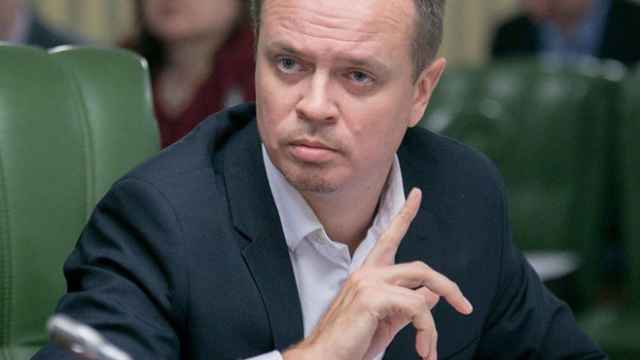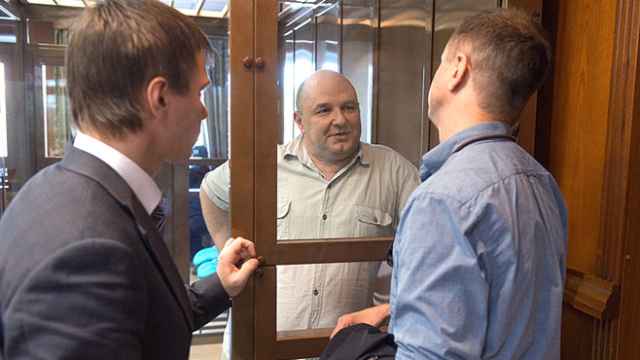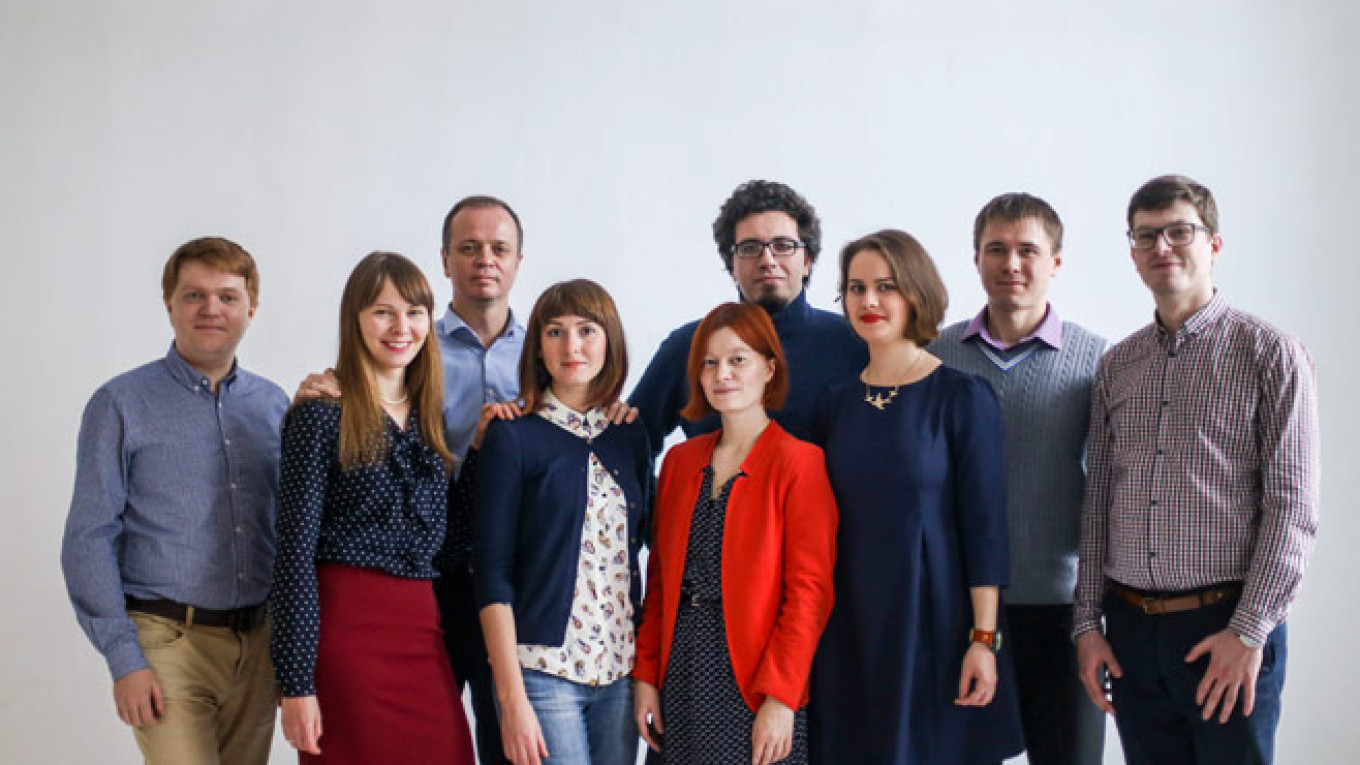"Every year the FSB, Russia's Federal Security Service, opens more and more cases of high treason. The processing of these cases is hidden from public view and fraught with arbitrariness. Lawyers of 'Team 29' will tell you what to do if the security services take an interest in you," reads the web page titled "If They've Come for You."
The preamble and advice that follows was posted in November and immediately garnered broad attention, quickly receiving more than 100,000 unique hits.
The instructions were written by Team 29 — an informal association of St. Petersburg-based lawyers and journalists devoted to protecting freedom of information in Russia. They take their name from Article 29 of the country's constitution, which specifies citizens' rights to information.
Continuing an 11-year history of crusading for such rights, the group has added the "If They've Come for You" project to its roster and found itself fighting on one of the most controversial and murky battlefronts of Russian law — defending people accused of high treason— as more and more such cases emerge.
With Russia's international isolation deepening over the Ukraine crisis, the country's authorities have declared information a new type of weapon — and have begun actively persecuting those who, in the state's opinion, use it to help foreign countries harm Russia.
According to Supreme Court data, the number of high treason cases tripled in 2014: 15 people were convicted on this charge, compared to four in 2013 and six in 2012. During the first six months of 2015, Supreme Court statistics show only three convictions but Russian media outlets report otherwise.
"Last year the media have reported there were at least 20 cases," Ivan Pavlov, "captain" of Team 29 and a lawyer specializing in treason and espionage cases, told The Moscow Times.
In 2015 Team 29 worked on a handful of notorious cases. Pavlov and his colleagues defended Svetlana Davydova, the mother of seven who was arrested on treason charges for calling the Ukrainian Embassy and reporting that she believed Russian armed forces were being deployed to Ukraine. Another client was Gennady Kravtsov, a former military radio engineer charged with treason for sending a job application letter to a Swedish defense company.
Team 29 also challenged in the Supreme Court a decree signed by President Vladimir Putin that declared peacetime military casualties to be a state secret. They lost two out of three of these battles — charges against Davydova were dropped a month after Pavlov took on the case — but remain optimistic and plan to continue their work despite the odds.
"The work that we do may seem hopeless on the surface," said Pavlov, 44. "Sometimes the way our courts function these days can lead to professional depression, but we don't have any other courts — so we need to work in the given conditions. Pessimism won't help," he said.
From Foreign Agents to Defending Traitors
Team 29 consists of lawyers, journalists and activists who used to work at the Free Information Foundation, an NGO devoted to freedom of information issues. After the foundation was declared a foreign agent, it shut down in 2014, but its staff decided it was too early to throw in the towel.
The foundation was created in 2004 and never concealed that it was receiving grants from abroad, said Team 29 lawyer Yevgeny Smirnov. After a series of inspections, court hearings and reviews by the Prosecutor's Office, it landed on the foreign agent list.
"We were not ready to continue our work under this label, so we decided to suspend the foundation's activity and create an informal association," Smirnov said.
"We realized that we would be consumed by fighting against the foreign agent label — constant inspections and fines — and would have to abandon our main cause," Team 29 leader Pavlov said.
Lawyers from the foundation began working as Team 29 in January 2015. Since they are not a formal organization, they believe they can avoid sanctions or crackdowns. "As an informal group of activists who are concerned by the issues our work is devoted to and know how to act upon them, we are invulnerable," Pavlov added.
The core of the team consists of nine lawyers and journalists who work together on a number of projects related to different aspects of information freedom in Russia. For most of them it is a full-time job, with an office and donors to fund their work, supplementing legal fees. Lawyers take cases from all over Russia? — including those that involve high treason charges.

Team 29 "captain" Ivan Pavlov has dedicated his career to defending? people accused of treason in Russia. He remembers when treason cases in Russia were winnable.
Treason Turns Trendy
The surge of treason cases is related to the "war climate" in the country, Pavlov said. "The war mentality drives the authorities to look for and fight enemies inside the country. Now they like to label them — organizations get the 'foreign agent' label, and individuals get the 'high treason' label," he said.
A request by The Moscow Times to the FSB for comment on the rapid growth of treason cases went unanswered by the time this article went to press.
Treason charges are always connected to information issues, Pavlov said. The mere act of treason, as it is defined in the law, consists of revealing information to foreign countries, and that is why treason cases fit perfectly into Team 29's self-declared mandate. Yet defending a person accused of treason is becoming harder, if not impossible, because when it comes to politically motivated cases that are tried behind closed doors, courts do not play fair, Pavlov said.
During Kravtsov's trial, the defense made 30 motions, all of which were denied. "They didn't allow us to question experts who concluded that Kravtsov revealed classified information [by sending his resume to Sweden] — and that was the crucial point of the charge! We basically weren't allowed to argue our case," he said.
Political motives behind treason charges are plainly visible, Smirnov said. "The nature of these cases changes depending on the geopolitical situation. At first people connected with Ukraine were targeted. Now it's very popular [to target those] related to NATO or the United States," he added. Soon we'll probably see spies connected to Turkey, Smirnov said.
Other Battlefronts
Team 29 lawyers are currently working on Kravtsov's appeal and another high treason case. They are defending Yevgeny Petrin, a former Russian Orthodox Church official accused of spying for the United States. Details of the case are classified — the only known fact is that Petrin claims he worked within the Church as an undercover FSB officer.
Pavlov and his team also help those charged with extremism — like Natalya Sharina, director of the Ukrainian Literature Library in Moscow. She was arrested in late October and accused of distributing extremist materials. The accusations were based on a search law enforcement officers conducted in the library prior to her arrest in which they found several books, written by Ukrainian radicals, that are banned in Russia.
Involvement in high-profile cases this year has overshadowed another important part of Team 29's work — fighting in courts to help Russians access government information to which they are legally entitled and de-classifying documents from Soviet times.
"It is very important, because often academics — historians, for one — can't access the documents they need for their research and governmental bodies ignore their requests or stall them for months," said Darya Sukhikh, a lawyer on Team 29.
One of the most recent cases undertaken was a class action suit filed in the Supreme Court, arguing that Putin's decree classifying military casualties incurred during special operations in peacetime does not comply with the law defining a state secret.
"Federal law defines what can be a state secret and what can't," said Pavlov. "We argued that military losses are in no way covered by the definition. Yet the court concluded it could be considered information about the number of troops [involved in an operation], which is a state secret," he added.
Team 29 appealed the ruling and invited linguistic experts who testified that the number of casualties does not necessarily reveal the number of troops, but the court sustained its ruling.
It is very hard to win a case like this, Sukhikh said. "In general, we lose 9 cases out of 10," she added with a sigh. "Still, it's another form of progress — people become more aware of their rights, and realize freedom of information is not just an abstract, vague notion — it is an issue that has now become a part of their lives."
They now run several web projects aimed at raising society's awareness and legal literacy — like RosOtvet or I Have the Right to Know, which gives citizens the opportunity to send their legal questions to Team 29 and receive answers from lawyers and government officials, said Asya Suvorova, Team 29's editor.
Another project, Municipal Combat, is designed to make local officials more transparent about their incomes and the policies they are implementing. A project called Open Utility Services educates Russians on various issues related to paying for utilities and dealing with companies that manage buildings. Finally, the "My Home is Being Searched. What should I do?" online instructions explain how a person can defend oneself from arbitrariness during a search.
If They're at the Door
Yet, the most popular web project Team 29 has initiated is the one related to high treason charges. The "If They've Come for You" online instructions contain legal advice on how to handle the FSB if it suddenly appears in your life.
The domestic intelligence and security service can show up, according to the website, anytime, anywhere and to, almost, anyone, "whether you published an article in a foreign media outlet, met with a foreigner you know or emailed your relatives abroad."
A person can be approached casually by FSB officers and invited to have an off the record conversation, which can later become the basis for a criminal case and lead to an unexpected arrest and interrogation. Authorities try to convince the person they arrest to cooperate and spill all information, according to the website.
The key is not to say anything and make sure your relatives do the same — even during the first official interrogation after arrest. "You have the right to do so under articles 46 and 47 of the Criminal Code," the website advises.
"You [also] need to warn your relatives not to testify and not to sign any confidentiality orders [that would then facilitate secrecy in the matter]." Article 51 of the Constitution gives everyone the right not to incriminate their relatives," it adds.
It is crucial not to testify and not to sign any documents until you obtain a competent lawyer, said Smirnov. "Most [treason] cases I dealt with were built on the testimony the arrested person gives during his first interrogation. A person dragged from home in the morning and thrown into prison is usually intimidated and scared enough to confess or sign anything."

Lawyers Yevgeny Smirnov and Ivan Pavlov speaking with Gennady Kravtsov, the radio engineer convicted of treason after sending his resume to a Swedish company.
Work That Matters
In October 2015, an investigation by The Moscow Times revealed at least one person was standing trial for high treason, three people were in pretrial detention facilities facing the same charge, four people were convicted in 2015 and already serving their sentences and only two people had charges against them dropped.
Despite the fact that a treason case is almost impossible to win, the work that Team 29 does — and there are few lawyers who take on cases like these — is very important, said Zoya Svetova, a journalist, human rights activist and a member of the Public Watch Commission who has gone to Lefortovo prison to visit many of those accused of treason.
"In the Russian legal system the work that a defense lawyer does might seem useless from the outside, but in fact it's not," Svetova said in an interview with The Moscow Times.
"It is important that a person arrested by the FSB has a lawyer with him to explain what to do, how to behave, what is he or she is accused of. And for a person who has spent a year or more behind bars, a lawyer is the only friend and sometimes the only connection to the real world. Months in prison can drive a person insane," she added.
Svetova confirmed Smirnov's statement about the role of statements people make during the first hours after arrest. "That's why [Team 29] deserve a monument for creating their ["If They've Come for You"] instructions, which were so popular on social networks," she said.
Their lawyers are not afraid of showing society that legal proceedings in Russia are, basically, inquisitions, especially the ones that involve high treason charges, Svetova added. "[Team 29 lawyers] take on these cases and, even they don't win them, they show how these cases work," she said.
Pavlov has defended people accused of treason in the past and he remembers when these cases were winnable. Hence, he remains keen to carry out this difficult work, Svetova said.
"It's a heroic effort. They're defending those who no one else will defend," she added.
When asked if the team plans to expand the "If They've Come for You" project further, team lawyer Smirnov said with a sad chuckle: "I wish we didn't have to develop it at all — I wish the problem didn't exist. But the circumstances dictate otherwise."
Contact the author at d.litvinova@imedia.ru
A Message from The Moscow Times:
Dear readers,
We are facing unprecedented challenges. Russia's Prosecutor General's Office has designated The Moscow Times as an "undesirable" organization, criminalizing our work and putting our staff at risk of prosecution. This follows our earlier unjust labeling as a "foreign agent."
These actions are direct attempts to silence independent journalism in Russia. The authorities claim our work "discredits the decisions of the Russian leadership." We see things differently: we strive to provide accurate, unbiased reporting on Russia.
We, the journalists of The Moscow Times, refuse to be silenced. But to continue our work, we need your help.
Your support, no matter how small, makes a world of difference. If you can, please support us monthly starting from just $2. It's quick to set up, and every contribution makes a significant impact.
By supporting The Moscow Times, you're defending open, independent journalism in the face of repression. Thank you for standing with us.
Remind me later.


